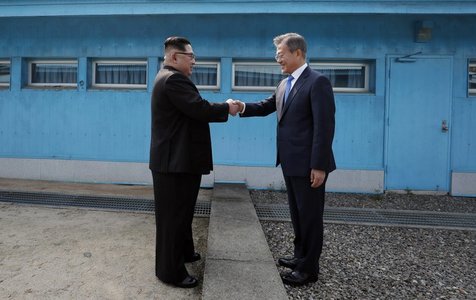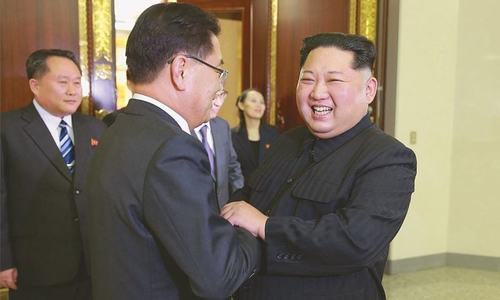North Korea on Tuesday blew up an office set up to foster better ties with South Korea in its border town of Kaesong after it threatened to take action if North Korean defectors went ahead with a campaign to send propaganda leaflets into the North.
North Korea’s KCNA state news agency said the liaison office, which had been closed since January over fears of the novel coronavirus, was “tragically ruined with a terrific explosion”.
Black-and-white surveillance video released by South Korea’s Ministry of Defence showed a large explosion that appeared to bring down the four-storey structure.
The blast also appeared to cause a partial collapse of a neighbouring 15-storey high-rise that had served as a residential facility for South Korean officials who staffed the liaison office.
The office, when it was operating, effectively served as an embassy for the old rivals and its destruction represents a major setback to efforts by South Korean President Moon Jae-in to coax the North into cooperation.
South Korea’s national security council convened an emergency meeting on Tuesday and said South Korea will sternly respond if North Korea continues to raise tensions.
The destruction of the office “broke the expectations of all people who hope for the development of inter-Korean relations and lasting peace on the peninsula”, deputy national security advisor Kim You-geun told a briefing.
“We’re making clear that the North is entirely responsible for all the consequences this might cause,” he said.
Tension has been rising over recent days with North Korea threatening to cut ties with South Korea and retaliate over the propaganda leaflets, which carry messages critical of North Korean leader Kim Jong Un, including on human rights.
KCNA said the office was blown up to force “human scum and those, who have sheltered the scum, to pay dearly for their crimes”.
North Korea refers to defectors as “human scum”.
A South Korean military source told Reuters that there had been signs that North Korea was going ahead with the demolition earlier in the day, and South Korean military officials watched live surveillance imagery as the building was blown up.
The first diplomatic mission of its kind, the inter-Korean liaison office was established in 2018 as part of a series of projects aimed at reducing tensions between the two Koreas.
The building had been originally used as offices for managing operations at the Kaesong Industrial Complex, a joint venture between the two Koreas that was suspended in 2016 amid disagreement over the North’s nuclear and missile programmes.
South Korea spent at least $8.6 million in 2018 to renovate the building, which stood as a gleaming blue glass structure in the otherwise drab industrial city.
When it was operating, South Koreans worked on the second floor and North Koreans on the fourth floor. The third floor held conference rooms for meetings between the two sides.
When the office was closed in January, South Korea said it had 58 personnel stationed there.
South Korea’s won weakened by about 0.7 per cent against the dollar in offshore non-deliverable forward trade as reports of the building being blown up emerged after onshore spot trade finished.
Rising tensions
On Saturday, North Korean state media reported that Kim Yo Jong, the sister of the North Korean leader, who serves as a senior official of the ruling Workers’ Party, had ordered the department in charge of inter-Korean affairs to “decisively carry out the next action”.
“Before long, a tragic scene of the useless north-south joint liaison office completely collapsed would be seen,” she was reported as saying.
Russia said on Tuesday that it was concerned about the situation on the Korean peninsula and called for restraint from all sides, but so far had no plans for high-level diplomatic contacts to ease the tensions.
Earlier on Tuesday, North Korean state media quoted the military as saying it has been studying an “action plan” to re-enter zones that had been demilitarised under a 2018 inter-Korean pact and “turn the front line into a fortress”.
South Korea’s defence ministry called for North Korea to abide by the 2018 agreement, under which both sides’ militaries vowed to cease “all hostile acts” and dismantled a number of structures along the heavily fortified Demilitarised Zone between the two countries.
Several defector-led groups have regularly sent back flyers, together with food, $1 bills, mini radios and USB sticks containing South Korean dramas and news into North Korea, usually by balloon over the border or in bottles by river.
South Korea, which has been keen to improve ties with the North, called on the defectors to stop and plans legal action against two defector groups, saying their actions fuel cross-border tensions, pose risks to residents living near the border and cause environmental damage.
But the groups have said they intend to push ahead with their planned campaign this week.
South Korea’s President Moon urged North Korea on Monday to keep peace agreements reached by the two leaders and return to dialogue.
















































